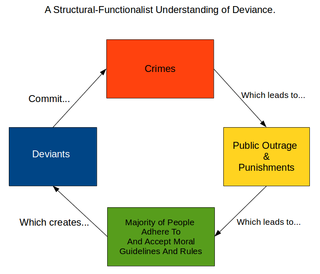
Medical psychology, or Medico-psychology, is the application of psychological principles to the practice of medicine, primarily drug-oriented, for both physical and mental disorders.
Outpatient commitment—also called assisted outpatient treatment (AOT) or community treatment orders (CTO)—refers to a civil court procedure wherein a legal process orders an individual diagnosed with a severe mental disorder to adhere to an outpatient treatment plan designed to prevent further deterioration or recurrence that is harmful to themselves or others.
Health, according to the World Health Organization, is "a state of complete physical, mental and social well-being and not merely the absence of disease and infirmity". A variety of definitions have been used for different purposes over time. Health can be promoted by encouraging healthful activities, such as regular physical exercise and adequate sleep, and by reducing or avoiding unhealthful activities or situations, such as smoking or excessive stress. Some factors affecting health are due to individual choices, such as whether to engage in a high-risk behavior, while others are due to structural causes, such as whether the society is arranged in a way that makes it easier or harder for people to get necessary healthcare services. Still, other factors are beyond both individual and group choices, such as genetic disorders.
Social work is an academic discipline and practice-based profession concerned with meeting the basic needs of individuals, families, groups, communities, and society as a whole to enhance their individual and collective well-being. Social work practice draws from areas, such as psychology, sociology, health, political science, community development, law, and economics to engage with systems and policies, conduct assessments, develop interventions, and enhance social functioning and responsibility. Social work practice is often divided into three levels. Micro-work involves working directly with individuals and families, such as providing individual counseling/therapy or assisting a family in accessing services. Mezzo-work involves working with groups and communities, such as conducting group therapy or providing services for community agencies. Macro-work involves fostering change on a larger scale through advocacy, social policy, research development, non-profit and public service administration, or working with government agencies. Starting in the 1980s, a few universities began social work management programmes, to prepare students for the management of social and human service organizations, in addition to classical social work education.

An advance healthcare directive, also known as living will, personal directive, advance directive, medical directive or advance decision, is a legal document in which a person specifies what actions should be taken for their health if they are no longer able to make decisions for themselves because of illness or incapacity. In the U.S. it has a legal status in itself, whereas in some countries it is legally persuasive without being a legal document.

A first responder is a person with specialized training who is among the first to arrive and provide assistance at the scene of an emergency, such as an accident, natural disaster, or terrorism. First responders typically include law enforcement officers, paramedics, EMT's and firefighters. In some areas, emergency department personnel, such as nurses and doctors, are also required to respond to disasters and critical situations, designating them first responders.

Forensic psychiatry is a subspeciality of psychiatry and is related to criminology. It encompasses the interface between law and psychiatry. According to the American Academy of Psychiatry and the Law, it is defined as "a subspecialty of psychiatry in which scientific and clinical expertise is applied in legal contexts involving civil, criminal, correctional, regulatory, or legislative matters, and in specialized clinical consultations in areas such as risk assessment or employment." A forensic psychiatrist provides services – such as determination of competency to stand trial – to a court of law to facilitate the adjudicative process and provide treatment, such as medications and psychotherapy, to criminals.

A humanitarian crisis is defined as a singular event or a series of events that are threatening in terms of health, safety or well-being of a community or large group of people. It may be an internal or external conflict and usually occurs throughout a large land area. Local, national and international responses are necessary in such events.
In social work, a caseworker is not a social worker but is employed by a government agency, nonprofit organization, or another group to take on the cases of individuals and provide them with advocacy, information and solutions. Also, in political arenas, caseworkers are employed as a type of legislative staffer by legislators to provide service to their constituents such as dealing with individual or family concerns. A social worker must obtain a Master degree level of education with the intent to provide social services, such as therapy. A titled Social Worker is required a Master's degree level of education from an accredited University and usually, though not always, pursues a state license after graduate school in the professional setting. British MPs and members of the United States Congress often provide constituent services through caseworkers for better use of their allotted funds.
Primary health care, or PHC, refers to "essential health care" that is based on scientifically sound and socially acceptable methods and technology. This makes universal health care accessible to all individuals and families in a community. PHC initiatives allow for the full participation of community members in implementation and decision making. Services are provided at a cost that the community and the country can afford at every stage of their development in the spirit of self-reliance and self-determination. In other words, PHC is an approach to health beyond the traditional health care system that focuses on health equity-producing social policy. PHC includes all areas that play a role in health, such as access to health services, environment and lifestyle. Thus, primary healthcare and public health measures, taken together, may be considered as the cornerstones of universal health systems. The World Health Organization, or WHO, elaborates on the goals of PHC as defined by three major categories, "empowering people and communities, multisectoral policy and action; and primary care and essential public health functions as the core of integrated health services[1]." Based on these definitions, PHC can not only help an individual after being diagnosed with a disease or disorder, but actively prevent such issues by understanding the individual as a whole.

Long-term care (LTC) is a variety of services which help meet both the medical and non-medical needs of people with a chronic illness or disability who cannot care for themselves for long periods. Long term care is focused on individualized and coordinated services that promote independence, maximize patients' quality of life, and meet patients' needs over a period of time.
Medical case management is a collaborative process that facilitates recommended treatment plans to assure the appropriate medical care is provided to disabled, ill or injured individuals. It is a role frequently overseen by patient advocates.
A mental health professional is a health care practitioner or social and human services provider who offers services for the purpose of improving an individual's mental health or to treat mental disorders. This broad category was developed as a name for community personnel who worked in the new community mental health agencies begun in the 1970s to assist individuals moving from state hospitals, to prevent admissions, and to provide support in homes, jobs, education, and community. These individuals were the forefront brigade to develop the community programs, which today may be referred to by names such as supported housing, psychiatric rehabilitation, supported or transitional employment, sheltered workshops, supported education, daily living skills, affirmative industries, dual diagnosis treatment, individual and family psychoeducation, adult day care, foster care, family services and mental health counseling.
A group home is a residence model of medical care for those with complex health needs. Traditionally, the model has been used for children or young people who cannot live with their families or afford their own homes, people with chronic disabilities who may be adults or seniors, or people with dementia and related aged illnesses. Typically, there are no more than six residents, and there is at least one trained caregiver there 24 hours a day. In some early "model programs", a house manager, night manager, weekend activity coordinator, and four part-time skill teachers were reported. Originally, the term group home referred to homes of 8 to 16 individuals, which was a state-mandated size during deinstitutionalization. Residential nursing facilities, also included in this article, may be as large in 2015 as 100 individuals, which is no longer the case in fields such as intellectual and developmental disabilities. Depending on the severity of the condition requiring one to need to live in a group home, some clients are able to attend day programs and most clients are able to live normal lifestyles.
Case management is a managed care technique within the health care coverage system of the United States. It involves an integrated system that manages the delivery of comprehensive healthcare services for enrolled patients. Case managers are employed in almost every aspect of health care and these employ different approaches in the control of clinical actions.
The recovery model, recovery approach or psychological recovery is an approach to mental disorder or substance dependence that emphasizes and supports a person's potential for recovery. Recovery is generally seen in this model as a personal journey rather than a set outcome, and one that may involve developing hope, a secure base and sense of self, supportive relationships, empowerment, social inclusion, coping skills, and meaning. Recovery sees symptoms as a continuum of the norm rather than an aberration and rejects sane-insane dichotomy.
Early and Periodic Screening, Diagnostic and Treatment (EPSDT) is the child health component of Medicaid. Federal statutes and regulations state that children under age 21 who are enrolled in Medicaid are entitled to EPSDT benefits and that States must cover a broad array of preventive and treatment services. Unlike private insurance, EPSDT is designed to address problems early, ameliorate conditions, and intervene as early as possible. For the 25 million children enrolled in Medicaid and entitled to EPSDT in 2012, the program is a vital source of coverage and a means to improve the health and well-being of beneficiaries.
Services for mental health disorders provide treatment, support, or advocacy to people who have psychiatric illnesses. These may include medical, behavioral, social, and legal services.
Case management is the coordination of community-based services by a professional or team to provide quality mental health care customized accordingly to individual patients' setbacks or persistent challenges and aid them to their recovery. Case management seeks to reduce hospitalizations and support individuals' recovery through an approach that considers each person's overall biopsychosocial needs without making disadvantageous economic costs. As a result, care coordination includes traditional mental health services but may also encompass primary healthcare, housing, transportation, employment, social relationships, and community participation. It is the link between the client and care delivery system.
Health policy and management is the field relating to leadership, management, and administration of public health systems, health care systems, hospitals, and hospital networks. Health care administrators are considered health care professionals.





